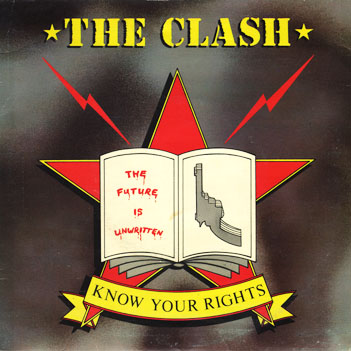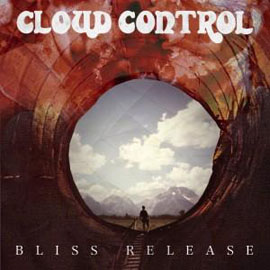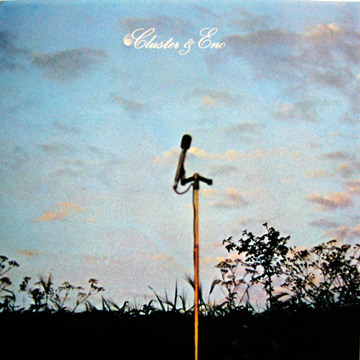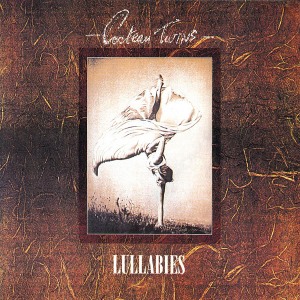

More great Australian indie rock, this time from Cloud Control and their debut album Bliss Release (2010). This is a really special album, and it's no surprise that it won a bunch of awards in its homeland. It's a great summation of the disparate elements that Australian indie rock has used over the years, and it makes a big deal of the kind of mysticism that Ed Kuepper has occasionally exploited along the way. It's a rolling piece of mildly psychedelic rock, chock full of great tunes which are always serious but never po-faced, and where other bands might sound forced, or even trite, Cloud Control always sound like the songs they're playing matter. It's really great stuff. They were absolutely charming when I saw them at last year's Field Day too.

Eno's collaboration with Germany's Cluster may have left the Germans feeling cheesed off (Eno turned up for a few days, recorded some stuff, then cleared off taking all the tapes with him and never bothered getting in touch with them again apparently) but what they came up with is pretty magical. It's the kind of languid, pre-Thursday Afternoon type of gear that Eno would make his stock in trade but there's something gently sinister going on in Cluster & Eno (1977) which makes for a nice sense of unease in listening. In some ways I think Eno may well have learned more from Cluster than vice versa as their penchant for repetitive loops was something that he would explore in much more depth after this project. In any event it's ten gentle melodies which unfurl themselves slowly and gracefully making for a truly beautiful record.

Jarvis Cocker's first solo album, Jarvis (2006) is a really great record, sorely underrated. I always felt that the less showing off he did the better his songs were and to my mind This Is Hardcore was Pulp's best album by miles. There's much less of the arch pretence about the Jarvis album and if anything it sounds rather like he had become so fed up at the state of things personally, professionally and, more importantly, politically that he had no choice but to "mature" as a songwriter. That's not saying much bearing in mind he has always been one of Britain's sharpest pop songwriters, but there's definitely a sense of purpose about Jarvis that was lacking in most Pulp records and I suspect it's the desire to say something that actually matters rather than something that rings true. The songs on the whole are very good but there's a determinedly mid-tempo pace to the album. It's all very much in the style of late Pulp, but I think filtered through a kind of 70's singer/songwriter lens. In any case, it's a very fine album indeed, but the considered, unaggressive sound seems to have meant that it's been consigned to pop history already.

And so now on to a very lengthy Cocteau Twins marathon, starting with debut album Garlands (1982). Garlands is a difficult album to love, particularly if you came to the Cocteau Twins slightly later, as both 4AD and Garlands were tied very much to an arthouse version of goth at the time. In fact 4AD were pretty exclusively an avant-goth label when they started, and although there are some clear signs in Garlands of the shimmering other-wordly beauties to come, it definitely fits the same general style as other 4AD acts like Xmal Deutschland and the early Wolfgang Press in that it's a dark record, bass-heavy, oppressive and claustrophobic. This is in large part due to original bass player Will Heggie's melodic but brooding, creepy and heavily foregrounded lines but Robin Guthrie's effects pedal wizardry was in its infancy too so there's not much variation in tone throughout the album. It's decent but it doesn't really demonstrate quite what remarkable imagination and aesthetic commitment was to come.

A little leap forward comes with the first of their many non-LP Ep's, Lullabies (1982) which although still having the same basic set-up (drum machine, metallic guitar, distracted wordless vocals from Liz Fraser) doesn't have the same obvious goth menace to it. The lead track, 'Feathers-Oar-Blades' is probably as vigorous as the band ever got (it's almost got a kind of pop song melody to it) and the other two are nearly as engaging. Part of the change relates to Heggie's bass being buried a little deeper in the mix and therefore not dominating to the same degree as on Garlands. On the whole Lullabies still has that goth charge but it's not so obvious and there are the seeds of a unique sensibility. At the same time as the records were developing, so too were 4AD and their in-house graphic design team 23 Envelope, whose work would define the records almost as much as the sound, and the cover of Lullabies is the first indication of quite how symbiotic the relationship would become, particularly for the Cocteau Twins. The next release was the Peppermint Pig EP (1983), which the band have often described as their worst record. I can sort of see why they were disappointed with it but not why they actively hated it so much. It's a pretty tuneless affair and all three songs are gone pretty briskly. There's none of the excitement of 'Feathers-Oar-Blades' and it's all a bit scrappy. Great sleeve though. Peppermint Pig was Heggie's last appearance and I suspect that the record sounds the way it does because things were getting fractious within the band.


There's an immediate change in sound on second album Head Over Heels (1983) with the introduction of new bassist Simon Raymonde, whose smooth, pulsating, propulsive basslines are still foregrounded, as Heggie's were but rather than dominating the songs, they let them expand and develop in a much more airy way and the result is that the sound is much less dense, much less frenetic. It also allows both Guthrie's guitar work and Fraser's increasingly remarkable vocals room to develop as well. The songs on Head Over Heels are strictly melodic which is in itself a development. One of their earliest works of true brilliance, 'Sugar Hiccup' appears on Head Over Heels, and that song pointed very clearly the direction in which the band should and would go. Although it's still a relatively tinny album, and that brooding goth element still lingers in the background, it's a wonderful record. 'Sugar Hiccup' was chosen to lead the next EP, Sunburst and Snowblind (1983) but the other three songs on it are almost as fine. 'Hitherto' and particularly 'From the Flagstones' are as good as, if not better, than everything on the album. In many ways Head Over Heels and Sunburst and Snowblind were the turning point for the band, the first records on which their trademark glacial grace really appeared and the last on which the goth influence appeared, and, once again, the work of 23 Envelope is pefectly matched to the sound.


It was the following year that saw the Cocteau Twins consolidate their sound and refine it into something utterly unique, precious to some, but to me absolutely untouchably wonderful. The first really astonishing release was the Spangle Maker EP (1984). The three songs on this EP are each truly wonderful, and the real key to the change was that the whole band had discovered that the music they were making didn't need to only be an intellectual exercise, it could be an emotional one as well, as this is avant-garde pop music acting as emotional catharsis, it's simply beautiful stuff. The absolute crowning glory of their art was 1984's Treasure, an album so full of beauty, grace, charm, emotional clarity and artistic poise that it baffles me every time I listen to it. The breadth of experimentation in Guthrie's guitar work (thanks to a multitude of effects pedals, admittedly), the confidence and sheer beauty of Fraser's voice (which by this point had become as remarkable an instrument as a voice can be), and the graceful drive of Raymonde's discreet bass make for a record that's remarkably varied stylistically while never veering for a moment from its central sound and that shows an astonishing willingness to experiment in a constrained form. It's just a fabulous record both in terms of brilliance but also its otherwordliness, it sometimes sounds like something that happened rather than that people made. Too much to link to the whole album? I don't think so.


Loads more ethereal whimsicality tomorrow.
No comments:
Post a Comment